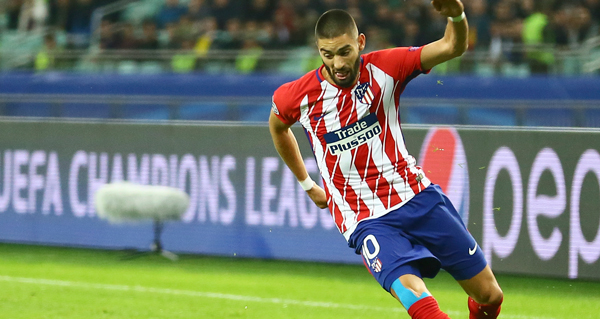Sometimes soccer just needs explaining. You could be forgiven for being gobsmacked by Yannick Carrasco, a 24-year-old Belgian international who came on at halftime of a Champions League final less than two years ago, scored a goal, and looked like one of the best players on the pitch, joining the Chinese Super League’s newly promoted Dalian Yifang, in late February, with Atletico Madrid kinda-sorta challenging Barcelona for the Liga title and favorites to win the Europa League. Why don’t Atleti want him anymore? Why doesn’t he wait until the summer? Why China?
That first part is the simplest. Carrasco, like many pacey wingers before him, is temperamental, which is tolerable when a player is performing like Nani at his peak or Douglas Costa circa 2015 but downright destructive when the player isn’t chipping in goals with any regularity, which Carrasco more or less hasn’t since joining Atleti in the summer of 2015. He’s an alluring talent who can produce beautiful, defender-erasing runs down the left flank, but he’s also an atrocious decision-maker who habitually takes on one opponent too many and likes to employ Arjen Robben’s cut-inside-and-fire move without being nearly as precise with his right foot as Robben is with his left. He’s a wasteful player who looks a lot better in highlight videos than actual games, and as his playing time has dwindled at Atleti, he has become sour and argumentative, getting into spats with Diego Simeone, assistant coach Mono Burgos, and revered team trainer Profe Ortega. Carrasco has been on his way out of the club for a few months now, but the timing of his exit and his choice to leave Europe altogether are surprising.
Though it does make a certain amount of sense that he would end up at Dalian Yifang. In January of 2015, Wang Jianlin, China’s richest man and founder and chairman of Dalian Wanda, the biggest private property developer in the world, bought twenty percent of Atlético Madrid. He didn’t have much interest in the club itself, but he wanted to use Atleti to gain a foothold in the Spanish construction business. This gambit worked out pretty pitifully. Wanda put their name on Atleti’s new stadium, the Wanda Metropolitano, which opened at the beginning of this season, but when the company purchased and attempted to tear down the stunning and long-vacant Edificio España in the heart of Madrid, they were rebuffed by the local government and had to sell the property off at a loss in December of 2016. That deal soured Wanda on Spain, and with the company being pressured by the Chinese government to reduce costly foreign investment, Wanda began to scale back, nixing nearly $4.5 billion worth of planned real estate projects in Britain, America, and Australia in 2017. A couple weeks ago, they dumped seventeen percent of their twenty percent share of Atleti on Quantum Pacific Capital, an investment group run by Israeli billionaire Idan Ofer.
And now Wanda, pivoting as they are back toward domestic business, are about to buy Dalian Yifang. The purchase isn’t official yet, but Yannick Carrasco’s switch signals that it must already be done. Dalian Yifang have also purchased Nico Gaitán—who is more of a prototypical Chinese transfer at this later stage of his career—and were sniffing around Fernando Torres earlier this week, though it looks like Torres is going to stay in Madrid until at least the end of the season. Basically, this is crony transfer activity. The curiously low reported fee for Carrasco—$37 million, for a player who has drawn interest from big clubs like Arsenal and Juventus—suggests that something odd is going on. Perhaps there are some add-ons involved or Atleti are reserving a large sell-on clause, but you can never quite know what businessmen in league with each other are doing beneath the table. The Gil family, who own fifty percent of Atletico Madrid, are historically crooked and hardly above suspicion and Wang Jianlin is—well, great fortunes, great crimes, state-run economies, etc.
Putting all the shady club-level stuff to one side, Carrasco obviously had final say in his exit. He hasn’t been completely out in the cold at Atleti, starting in five matches and getting subbed on in four others since the start of the new year, and we’re only a few months away from the opening of various European league’s transfer windows. He could have stuck it out, but apparently a gigantic contract—rumored to be around $12.3 million per season—was enough to entice him toward an early departure.
Where Carrasco goes from here is unclear. Fairly or not, the Chinese Super League is still regarded as nothing more than a payday league for good players. Oscar and Axel Witsel aren’t there to contribute to the rich histories of clubs that were founded in the mid-aughts. At twenty-four, Carrasco can play in China for a while and still come back to Europe in his prime, but he’s not going to polish his game taking on competition that would get demolished by most Eredivisie squads. He’s also fighting for a place in the Belgian national team in this summer’s World Cup, and if getting inconsistent minutes at Atlético Madrid wasn’t helping his case, it’s hard to see how starring in obscurity won’t hurt it. (Then again, Witsel consistently starts for Belgium, so maybe Roberto Martinez doesn’t care.) At best, the winger has made a lucrative lateral move. Whether it’s a brief detour or a more long-term, career-altering move remains to be seen. But it’s still a strange development, even if you’re familiar with its particulars.



